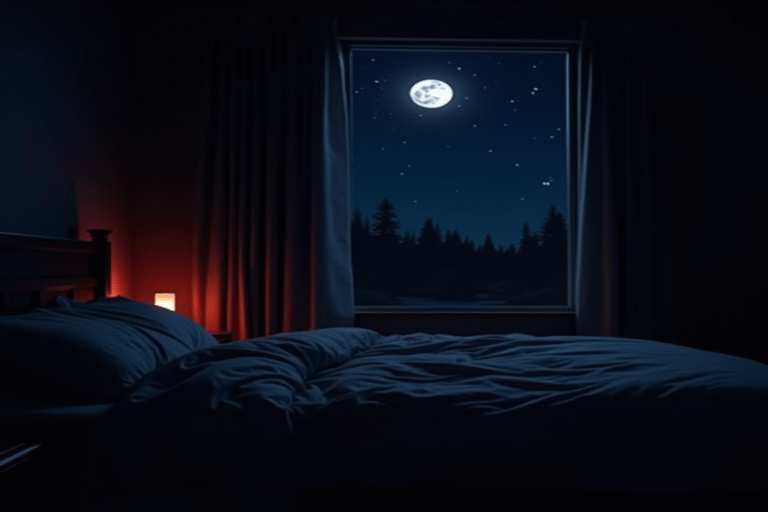Ever wondered why we instinctively turn off the lights when it’s time to sleep? Our bodies have evolved to function best in sync with natural darkness. The link between darkness and quality sleep is deeply rooted in our biology, and scientists continue to uncover how vital this relationship truly is.
Our Ancient Relationship with Darkness
For about 200,000 years, humans lived with fire and moonlight as the only sources interrupting the natural darkness of night. We evolved precise mechanisms to respond to the daily cycle of light and dark. When darkness falls, our brains register this cue and trigger a series of biological processes that prepare us for restful, restorative sleep.
Modern life has disrupted this ancient relationship. The invention of artificial lighting—and, more recently, the widespread use of screens emitting blue light—has resulted in what scientists call “light pollution.” This has consequences for our bodies and our health.
The Melatonin Mystery: Your Internal Sleep Regulator
Central to darkness-dependent sleep is melatonin, often called the “sleep hormone.” The pineal gland in your brain produces this hormone only when your eyes sense darkness. Melatonin not only makes you feel sleepy, it coordinates your entire sleep cycle and affects many other bodily functions.
Research published in the Journal of Pineal Research shows that even dim light—as little as 10 lux (similar to a nightlight)—can suppress melatonin production by up to 50%. Exposure to blue light from phones or tablets can suppress melatonin by as much as 80%, effectively convincing your brain that it’s still daytime.
The Surprising Health Benefits of Sleeping in Darkness
Cancer Prevention
One of the most significant findings is the connection between darkness during sleep and cancer prevention. The World Health Organization now classifies night shift work as a probable carcinogen due to disruption of the circadian rhythm. Studies have found that women who sleep with even low levels of light in their rooms have higher rates of breast cancer. This may be because melatonin helps suppress the growth of cancerous cells and supports DNA repair.
Weight Management
Sleeping with lights on affects more than just sleep quality. A major study published in JAMA Internal Medicine followed 43,722 women for five years and found that those who slept with a television or light on were 17% more likely to gain at least 5 kg, regardless of their diet or exercise habits. Researchers believe that light exposure during sleep disrupts metabolism and alters hormones that control hunger.
Mental Clarity and Emotional Health
When you sleep in complete darkness, your brain is more likely to cycle through all stages of sleep, especially deep REM sleep. This stage is crucial for:
- Memory consolidation and learning
- Emotional processing and regulation
- Creativity and problem-solving
- Reducing stress hormone levels
People who consistently sleep in the dark often report better mood, sharper thinking, and greater emotional resilience.
Hormonal Balance
In addition to melatonin, darkness helps regulate other vital hormones, such as:
- Growth hormone – Released mostly during deep sleep, needed for tissue repair and muscle development
- Cortisol – The “stress hormone,” which naturally decreases at night
- Leptin and ghrelin – Hormones that regulate appetite and fullness
How to Achieve Perfect Darkness
Creating an ideal dark sleep environment is simple:
- Install blackout curtains to block external lights like street lamps or early sun
- Remove electronics or cover their lights with tape
- Try a high-quality sleep mask that doesn’t press against your eyelids
- Use red-spectrum night lights if you need light at night, since red light interferes less with melatonin
- Establish a digital sunset by turning off bright screens 1-2 hours before bedtime
The Darkness Challenge
Your body can respond quickly to better sleep conditions. Try sleeping in complete darkness for a week and notice any differences in sleep quality, alertness, and mood. Many people feel the benefits after just a few nights—falling asleep faster, waking less at night, and feeling more refreshed in the morning.
Science now confirms what our ancestors instinctively knew: humans are meant to sleep in darkness. In our brightly lit world, making your bedroom truly dark could be one of the most powerful steps you can take for your health. Over thousands of years, our bodies have evolved to repair, regulate, and recover best in darkness—giving yourself these conditions is a simple act of self-care that can make a big difference.





